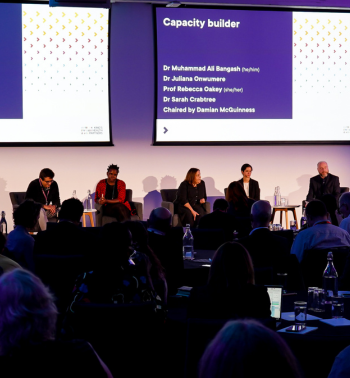22 October 2025
Last week 591 people joined King’s Health Partners hybrid 2025 Annual Conference. We rounded up some of the main themes from the day.
Working in partnership makes goals achievable
A panel chaired by KHP Exec Director Prof Graham Lord, with leaders from KHP founding partner organisations, explored the role of clinical academic partnership in delivering the NHS 10 Year Plan and Life Sciences Growth Plan.
The panel spoke about the importance of a partnership that supports staff and students to work across organisational boundaries, to deliver better health for patients and communities. The message was clear, to successfully innovate and improve outcomes in healthcare and life sciences KHP’s founding partners need to work together. Prof Sir Bashir Al-Hashimi, Vice President for Research & Innovation at King's College London said:
To be a successful academic, it’s not just about your papers, it’s about what else you have done with your knowledge. We are in a privileged position to change the world.
Jane Bailey, Chair at South London and Maudsley NHS FT, said KHP improves connections between mental and physical health care settings. Integrating mind and body is a core principle of the KHP Strategy to 2030, aiming to address the significant unmet need and stark health inequalities that exist for people living with mental and physical health conditions. Jane said:
How can we understand all the various factors that go into mental health? And how can we bring all the professions together? KHP for me brings those people together, brings that knowledge together, and I think that is the power of it.
Nurturing biotech companies is mutuality beneficial
Financial pressures and a demand for quick results from investors are among the challenges facing biotech companies, but Prof Robin Ali, Academic Lead for Advanced Therapies at King’s Health Partners, suggests our clinical academic centres have exactly what these companies need to thrive – the infrastructure and expertise to drive innovation and support clinical trials in experimental medicine.
Choosing a medical speciality is hard without examples
Shreya Shah, a third-year medical student talked about her collaboration with King’s Health Partners Academic Surgery through her roles as Vice President of the KCL Women in Surgery Society, Clinical Events Officer for the KCL Surgical Society, and student representative on the KHP board of surgery.
Shreya said she was not aware of the full breadth of work happening across King’s Health Partners - something which makes choosing a speciality hard for students. Shreya said students are eager to get involved in research and wanted to learn about clinical innovations, but the biggest barrier was knowing where to start. Calling for improved collaboration with student societies, Shreya said:
We have a lot that we want to bring to the table. We have a lot of curiosity. We're quite enthusiastic, and we have a fresh way of thinking. We've been able to use Google since we were kids, and we've been using AI in medical school, so I think the right opportunities can really benefit not just us, but also the wider health care community.
“It’s not an option to not engage”
Exploring KHP’s role as a capacity builder, Dr Juliana Onwumere explained how KHP can build sustained and reciprocal relationships between community research teams and KHP research teams. Taking lessons from her work with the Building Equity and Diversity (BREAD) in research network, Dr Onwumere said:
“Our research is linked to service excellence, so it’s not an option for us not to be included, but also it’s not an option to not engage.”
Dr Onwumere’s advice for research teams across the partnership was:
- Establish what you’re trying to do;
- Identify the voices that are missing;
- Try to understand the language of the different groups;
- Listen to what patients and communities are telling you;
- Share your research with the people who have been involved.
Dr Onwumere said the biggest issue for underserved groups is how research outcomes are shared with the patients and communities involved.
For many groups and particularly the underserved groups… one of the biggest issues that we can change overnight is making sure that when we are doing research, we are sharing that with people that we have worked with.
How can staff and student benefit from partnership
King’s Health Partners Annual Conference 2025 demonstrated how we support staff and students through our role as a connector, builder of capacity, and creator of opportunity.
You can get involved straight away. To expand your network, start registering for the KHP events and courses. To expand your capacity for research you can apply for fellowships with the KHP Centre for Translation Medicine. For collaboration opportunities sign up to KHP News for all the latest work happening across the partnership.





